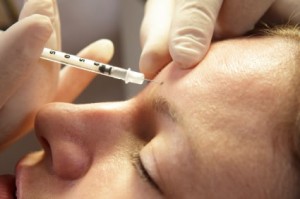The project, led by Dr Michael Lewis, School of Psychology in conjunction with Court House Clinics and published in the Journal of Cosmetic Dermatology, compared the mood of patients who received Botox treatment for frown lines with patients who received other forms of cosmetic treatments.
Patients who received the treatment to the forehead had a significantly more positive mood than those who had received other forms of treatment.
Dr Lewis said: “Botox injections are a cosmetic treatment for frown lines which temporarily paralyses some of the muscles in the face. Patients who receive this cosmetic treatment find negative facial expressions harder to make.
“It appears that the lack of negative mood feedback from the facial muscles – the fact that patients are unable to frown – leads to those patients feeling happier.”
Botox is the popular name for a type of cosmetic treatment. The generic name for the drug is Botulinum Toxin A. Other licensed brands of the drug include Dysport and Myobloc.
Patients’ happiness levels were assessed using a questionnaire for irritability, anxiety and depression. Questionnaires were distributed amongst patients of Court House Clinics, a provider of cosmetic therapies.
Of the 25 participants who took part in the study, all had undergone some form of aesthetic cosmetic treatment. Twelve of the participants had undergone Botox treatment to the forehead. Patients who received Botox for frown lines were significantly less depressed, anxious and irritable than those who had not.
Dr Lewis added: “It was Charles Darwin who first suggested the idea that emotional expressions help to maintain or amplify a felt emotion. Our research explored the idea that the failure to form negative facial expressions made negative emotions harder to maintain.
“It appears the inability to frown makes patients feel happier.”

